 A settlement in a lawsuit over immigration enforcement in Sonoma County either makes notable changes in policy, or merely codifies current practices. Either way, both sides seem satisfied.
A settlement in a lawsuit over immigration enforcement in Sonoma County either makes notable changes in policy, or merely codifies current practices. Either way, both sides seem satisfied.
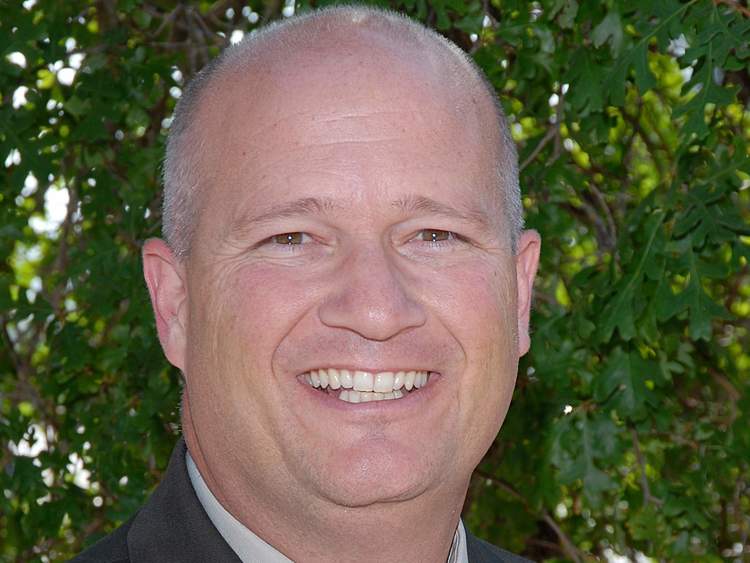 Sheriff Steve FreitasOne of the key issues in the suit involved the notification of ICE when any undocumented persons wound up in the county jail. Sheriff Steve Freitas says the department's policy had already changed, independent of the legal action.
Sheriff Steve FreitasOne of the key issues in the suit involved the notification of ICE when any undocumented persons wound up in the county jail. Sheriff Steve Freitas says the department's policy had already changed, independent of the legal action.
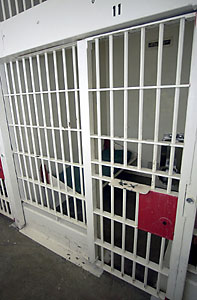 Another of the lawsuit's outcomes will be immediately visible within the jail itself, notes Rick Coshnear of the Committee for Immigrant Rights of Sonoma County.
Another of the lawsuit's outcomes will be immediately visible within the jail itself, notes Rick Coshnear of the Committee for Immigrant Rights of Sonoma County.
ACLU lawyer Julia Harumi Mass says the newly announced settlement isn't exactly a legal precedent, but the resulting policies may serve as a model for other counties to emulate.
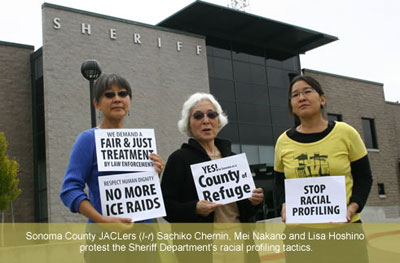 When ICE calls asking for a hold on someone in the Sonoma County jail, departmental policy assumes that to be a mandatory request. That remains a contentious issue, says Mass, as advocacy groups feel strongly that such calls are requests, and the county's choice to agree or not is discretionary. And she adds, they have ample documentation to support that view.
When ICE calls asking for a hold on someone in the Sonoma County jail, departmental policy assumes that to be a mandatory request. That remains a contentious issue, says Mass, as advocacy groups feel strongly that such calls are requests, and the county's choice to agree or not is discretionary. And she adds, they have ample documentation to support that view.
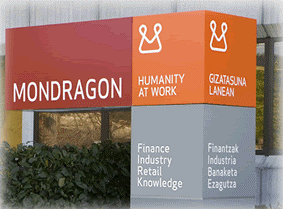 The driving motive for the Mondragon Cooperatives of northern Spain is not earnings, but strengthening community and boosting quality of life. Their considerable profits are secondary.
The driving motive for the Mondragon Cooperatives of northern Spain is not earnings, but strengthening community and boosting quality of life. Their considerable profits are secondary.
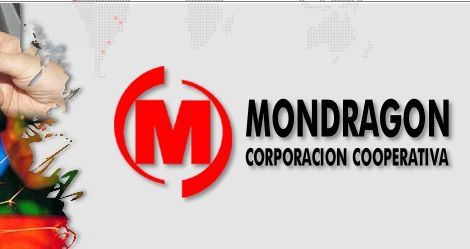 Sonoma's Praxis Peace Institute has hosted two previous study-tours of the Mondragon Cooperatives, in 2008 and 2010, and has another coming up in September. Institute Founder and Director Georgia Kelly describes some highlights of the trip.
Sonoma's Praxis Peace Institute has hosted two previous study-tours of the Mondragon Cooperatives, in 2008 and 2010, and has another coming up in September. Institute Founder and Director Georgia Kelly describes some highlights of the trip.
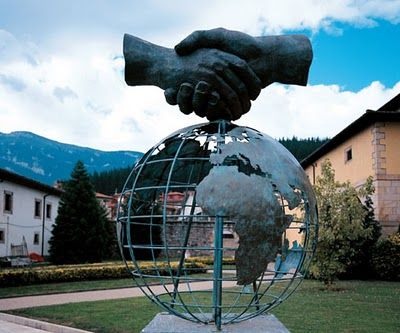 The people-first ethic that drives the Mondragon enterprises is far different than the values of most businesses, in Spain and beyond. For example, Kelly recounts, no worker is ever fired.
The people-first ethic that drives the Mondragon enterprises is far different than the values of most businesses, in Spain and beyond. For example, Kelly recounts, no worker is ever fired.
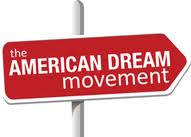 It means many things to many people, but there's a widespread sense that "The American Dream" is now tattered, tarnished or unattainable. A nationwide series of informal gatherings over the coming weekend is meant to rebuild a collective vision of what it should be, and how we might realize it.
It means many things to many people, but there's a widespread sense that "The American Dream" is now tattered, tarnished or unattainable. A nationwide series of informal gatherings over the coming weekend is meant to rebuild a collective vision of what it should be, and how we might realize it.
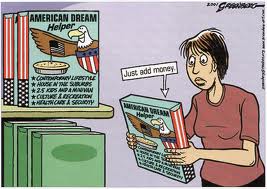 Each of the American Dream meeting sites (see the list here) will follow an agenda developed by the individual host or hosts. Meredith Caplan outlines the plan that she and her husband, Steve Bush, have prepared for the group that will gather at their Santa Rosa home Saturday afternoon.
Each of the American Dream meeting sites (see the list here) will follow an agenda developed by the individual host or hosts. Meredith Caplan outlines the plan that she and her husband, Steve Bush, have prepared for the group that will gather at their Santa Rosa home Saturday afternoon.
A list of priority issues from those assembled is one intended outcome for the American Dream Movement meetings. But Guerneville resident David Martin, who will host a gathering there tomorrow afternoon, already his own list in mind.
 The Federal Reserve Bank plays a critical, but low-profile role in maintaining the stability of our national economy. Today's' report offers a peek into the Fed's internal functions.
The Federal Reserve Bank plays a critical, but low-profile role in maintaining the stability of our national economy. Today's' report offers a peek into the Fed's internal functions.
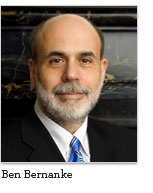 Normally, the adjustments the Federal Reserve makes are modest, and timed to have gradual effects. But that was not the case in 2008, Osmer explains, when unprecedented actions were taken to ward off the threat of a new nationwide depression.
Normally, the adjustments the Federal Reserve makes are modest, and timed to have gradual effects. But that was not the case in 2008, Osmer explains, when unprecedented actions were taken to ward off the threat of a new nationwide depression.
A deeper look inside The Fed is on tap tonight at 6:30, when the Science Buzz Cafe convenes at Coffee Catz in Sebastopol. See their full schedule of summer events here.

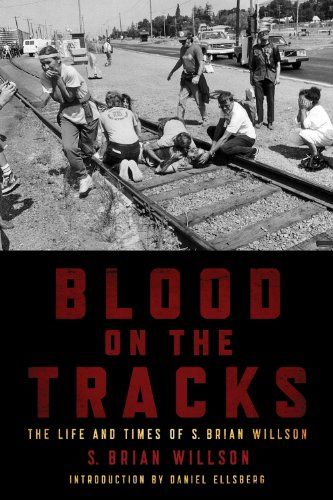 In a horrific peaceful protest gone wrong, S. Brian Wilson lost both his legs when he was run over by a train loaded with military weaponry. He's written about that experience, and much more, in a newly published memoir.
In a horrific peaceful protest gone wrong, S. Brian Wilson lost both his legs when he was run over by a train loaded with military weaponry. He's written about that experience, and much more, in a newly published memoir.
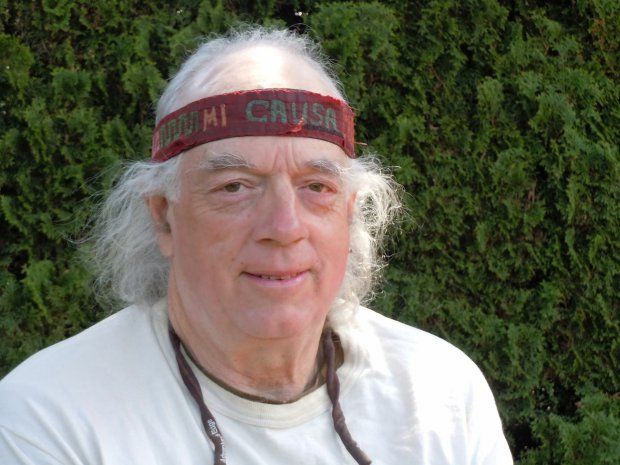 S. Brian WilsonAfter recovering from his encounter with the munitions train, Willson acquired a pair of prosthetic legs with which he can walk freely now. But because of the circumstances—and the politics through which he got them, Brian often refers to them as his "third world legs."
S. Brian WilsonAfter recovering from his encounter with the munitions train, Willson acquired a pair of prosthetic legs with which he can walk freely now. But because of the circumstances—and the politics through which he got them, Brian often refers to them as his "third world legs."
On September 1, 1987, Willson was quietly sitting between the tracks as the train approached, part of a well-publicized protest intended to delay, if not halt, the shipment of weaponry it carried. He says he has no memories at all of the locomotive bearing down on him or its impact. And he's surprised to have lived through the near-lethal encounter.
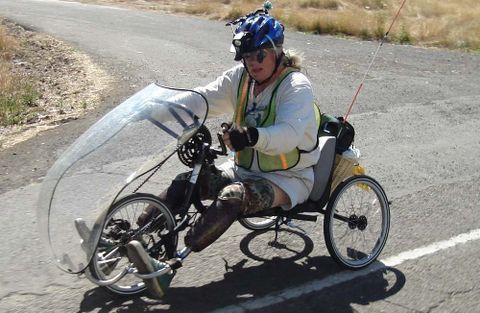 Willlson's book tour, which began in his hometown of Portland, has been somewhat leisurely in its pace, due to his decision to travel from town to town exclusively on his hand-powered bicycle.
Willlson's book tour, which began in his hometown of Portland, has been somewhat leisurely in its pace, due to his decision to travel from town to town exclusively on his hand-powered bicycle.
S. Brian Willson's remaining Bay Area book tour dates for Blood on the Tracks are as follows:
TUESDAY JULY 12 • SANTA ROSA 7:15pm - Santa Rosa Friends House, 684 Benicia Dr.
WEDNESDAY JULY 13 • WALNUT CREEK 7:00pm - Mt. Diablo Peace and Justice Center, 55 Eckley Ln.
THURSDAY JULY 14 • SEBASTOPOL 7:00pm - Community Church of Sebastopol, 1000 Gravenstein Hwy North (sponsored by Copperfields)
FRIDAY JULY 15 • SAN RAFAEL 7:30pm - First United Methodist Church, 9 Ross Valley Dr. (at Third)
SUNDAY JULY 17 • SAN FRANCISCO 12:30pm - First Unitarian Church, 1187 Franklin St. (at Geary)
MONDAY JULY 18 • BERKELEY 6:00pm (talk begins at 7) - Berkeley Fellowship of Unitarian Universalists, 1924 Cedar St. (at Bonita)
TUESDAY JULY 19 • SAN JOSE 7:00pm - San Jose Peace AND Justice Center, 48 S. 7th St.
WEDNESDAY JULY 20 • CAPITOLA 7:30pm - Capitola Book Café, 1475 41st Ave., Capitola
FRIDAY JULY 22 • SEASIDE 5:00pm - Peace Resource Center, 1364 Fremont Blvd.
BLOOD ON THE TRACKS is available for purchase from your favorite bookseller or from PM Press.

 Live Radio
Live Radio